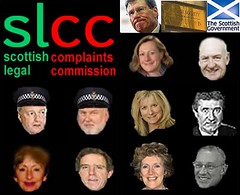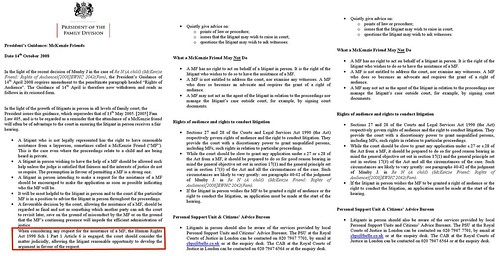 Scottish Legal Complaints Commission refuses to disclose members expenses claims. POTENTIAL MENTAL HEALTH & SAFETY PROBLEMS of four lawyers and four ‘lay people’ (two of whom are ex-senior ranked Policemen, one of whom actually served on a Law Society of Scotland Committee) have been raised by the beleaguered, scandal hit Scottish Legal Complaints Commission as excuses for refusing to disclose board members expenses, this coming after the SLCC has today been stung by claims from solicitors clients, consumer groups, & even politicians that the Commission operates an anti-consumer complaints system which has after one year, yet to have a single success for a client.
Scottish Legal Complaints Commission refuses to disclose members expenses claims. POTENTIAL MENTAL HEALTH & SAFETY PROBLEMS of four lawyers and four ‘lay people’ (two of whom are ex-senior ranked Policemen, one of whom actually served on a Law Society of Scotland Committee) have been raised by the beleaguered, scandal hit Scottish Legal Complaints Commission as excuses for refusing to disclose board members expenses, this coming after the SLCC has today been stung by claims from solicitors clients, consumer groups, & even politicians that the Commission operates an anti-consumer complaints system which has after one year, yet to have a single success for a client.
 SLCC Chair, Jane Irvine – our members ‘mental health’ is on the line. Jane Irvine's written refusal of full disclosure over members expenses details stated : "I have studied each and every record we hold and am perfectly satisfied that the SLCC is entitled to extract the information from records held, namely what was claimed and paid. Further that the actual claim forms etc which you now state you require are both confidential under s.36(2) and personal data under s.38(1)(b) thus we may withhold the records as exempt."
SLCC Chair, Jane Irvine – our members ‘mental health’ is on the line. Jane Irvine's written refusal of full disclosure over members expenses details stated : "I have studied each and every record we hold and am perfectly satisfied that the SLCC is entitled to extract the information from records held, namely what was claimed and paid. Further that the actual claim forms etc which you now state you require are both confidential under s.36(2) and personal data under s.38(1)(b) thus we may withhold the records as exempt."
Ms Irvine staggeringly went on to claim the full release of expenses claims details may harm the safety or mental health of SLCC board members. Jane Irvine : "In addition, I consider we can withhold them under s.39 in that release might endanger the physical or mental health or safety of an individual."
SLCC Chairman Jane Irvine’s extraordinary about-turn on Freedom of Information compliance policy by the joint public-legal profession funded Scottish Legal Complaints Commission, comes after the SLCC, which has so far received a staggering two million pounds of public money from the Scottish Government, received an FOI request for the expenses claims made by its members, which can be revealed today at a staggering £128,624.00 on fees alone in an eleven month period.
The SLCC’s new anti-FOI stance also contradicts Ms Irvine’s earlier supported for making the Law Society of Scotland FOI compliant, which I reported on several months ago, here : Legal Complaints Chief supports ‘consumer advantages’ of removing Law Society’s Freedom of Info immunity
 Jane Irvine claimed SLCC members with huge expenses claims might ‘face mental health problems’ if details of their salaries were disclosed. A legal insider today attacked the SLCC's decision to resort to secrecy over members expenses and said today : "This is deplorable. It seems when the going gets tough, the SLCC stoops to secrecy in order to protect itself from accountability on issues like members expenses. There must be a lot of duck houses to hide if this hugely expensive & unnecessary law complaints quango feels it cannot publish its members expenses claims in the same way politicians at Holyrood, and even Westminster Parliament have been forced to reveal. The Chair's reasons for secrecy are astounding. It is very bottom of the barrel stuff for Jane Irvine to claim these extravagantly paid board members mental health or safety could be affected by exposing their expenses claims to public scrutiny."
Jane Irvine claimed SLCC members with huge expenses claims might ‘face mental health problems’ if details of their salaries were disclosed. A legal insider today attacked the SLCC's decision to resort to secrecy over members expenses and said today : "This is deplorable. It seems when the going gets tough, the SLCC stoops to secrecy in order to protect itself from accountability on issues like members expenses. There must be a lot of duck houses to hide if this hugely expensive & unnecessary law complaints quango feels it cannot publish its members expenses claims in the same way politicians at Holyrood, and even Westminster Parliament have been forced to reveal. The Chair's reasons for secrecy are astounding. It is very bottom of the barrel stuff for Jane Irvine to claim these extravagantly paid board members mental health or safety could be affected by exposing their expenses claims to public scrutiny."
A client who is having considerable difficulty with the SLCC over a serious complaint made against a leading law firm involving fraud also commented, saying : "What's sauce for the goose is sauce for the gander. I have spent months writing back & forth to this high salaried mob at the SLCC about my complaint and am no further forward. In my opinion they don't deserve the flood of money they have received."
He continued : "From the way they are treating the public, Jane Irvine should be more worried about the mental health & safety of clients who I also read have been driven to suicide over trying to complain against a crooked lawyer. Maybe the SLCC board members and their fat expense accounts should come down off their perch and treat us a bit better instead of worrying so much about what people will think over their expenses claims."
 SLCC provided misleading information only admitting to £6k expenses on earlier FOI request. It can also be revealed today that the Scottish Legal Complaints Commission apparently intentionally provided deceptive information to an earlier FOI request from the media over members expenses, where the SLCC claimed the total sums claimed and paid to Members between 1 October and 31 August 2009 at £6408.96. However, when quizzed further on the figures, the SLCC Chair, Jane Irvine issued a new statement contradicting the earlier FOI response on members expenses, and admitted that between 1 October 2008 and 31 August 2009 members received total further payments of a staggering £128,624.00 by way of fees, giving the following 'varying interpretation' reason for the staggering £122,216.00 error in the Commission's expenses accounting figures.
SLCC provided misleading information only admitting to £6k expenses on earlier FOI request. It can also be revealed today that the Scottish Legal Complaints Commission apparently intentionally provided deceptive information to an earlier FOI request from the media over members expenses, where the SLCC claimed the total sums claimed and paid to Members between 1 October and 31 August 2009 at £6408.96. However, when quizzed further on the figures, the SLCC Chair, Jane Irvine issued a new statement contradicting the earlier FOI response on members expenses, and admitted that between 1 October 2008 and 31 August 2009 members received total further payments of a staggering £128,624.00 by way of fees, giving the following 'varying interpretation' reason for the staggering £122,216.00 error in the Commission's expenses accounting figures.
 SLCC Chief Jane Irvine threatens media ‘no more FOIs’ after asking for board members expenses details. After having to admit the huge discrepancies in the FOI release of expenses claims, the SLCC’s Chair, Jane Irvine, threatened to brand journalists Freedom of Information enquires as “vexatious” as she was forced to admit the huge ‘accounting error’, saying : "Having stated all this I have very carefully considered the exact wording of your request as you have directed me to. This might be read two ways. Either as a request for records of all claims for expenses and money paid as expenses - which we have answered, or a request for records plus a request for records of all money paid. I have not sought to clarify this with you. Rather I have interpreted it expansively and in this context advise that between 1 October 2008 and 31 August 2009 Members received total further payments of £128,624.00 by way of fees."
SLCC Chief Jane Irvine threatens media ‘no more FOIs’ after asking for board members expenses details. After having to admit the huge discrepancies in the FOI release of expenses claims, the SLCC’s Chair, Jane Irvine, threatened to brand journalists Freedom of Information enquires as “vexatious” as she was forced to admit the huge ‘accounting error’, saying : "Having stated all this I have very carefully considered the exact wording of your request as you have directed me to. This might be read two ways. Either as a request for records of all claims for expenses and money paid as expenses - which we have answered, or a request for records plus a request for records of all money paid. I have not sought to clarify this with you. Rather I have interpreted it expansively and in this context advise that between 1 October 2008 and 31 August 2009 Members received total further payments of £128,624.00 by way of fees."
 FOI disclosure exposed SLCC Board member Margaret Scanlan who wanted consumer groups excluded from SLCC business. As the SLCC’s new anti-FOI stance gathers pace, Commission insiders have also claimed that in order to stem the rising numbers of FOI requests from the media, necessitated by the Commission’s secrecy policy on just about everything, and the SLCC’s consistently late publishing of monthly minutes (up to six months late in some cases, alongside significant use of black ink) the Commission has also decided to charge for any & all FOI requests, in the hopes of putting off enquiries which may lead to further embarrassing & compromising revelations such as some of those already reported in the media where ‘on the razzle’ board members and senior SLCC officials embarked on bitter hate-fuelled email rants against consumer groups, members of the public, solicitors clients and even media journalists who all came in for heavy criticism and insults after publication of problems at the Scottish Legal Complaints Commission.
FOI disclosure exposed SLCC Board member Margaret Scanlan who wanted consumer groups excluded from SLCC business. As the SLCC’s new anti-FOI stance gathers pace, Commission insiders have also claimed that in order to stem the rising numbers of FOI requests from the media, necessitated by the Commission’s secrecy policy on just about everything, and the SLCC’s consistently late publishing of monthly minutes (up to six months late in some cases, alongside significant use of black ink) the Commission has also decided to charge for any & all FOI requests, in the hopes of putting off enquiries which may lead to further embarrassing & compromising revelations such as some of those already reported in the media where ‘on the razzle’ board members and senior SLCC officials embarked on bitter hate-fuelled email rants against consumer groups, members of the public, solicitors clients and even media journalists who all came in for heavy criticism and insults after publication of problems at the Scottish Legal Complaints Commission.
You can read an earlier account of scandals at the SLCC revealed by FOI requests here : MacAskill must clean up law complaints body as members 'booze culture conduct' reflects lack of discipline & will to investigate crooked lawyers & here : Censorship & ‘frequent flyers’ at Scottish Legal Complaints Commission reveal attempt to write off consumers evidence in Master Policy report
A Scottish Parliamentary insider today said : “The way the SLCC is operating is clearly not what was intended in the LPLA Act and clearly the commission has a poor attitude towards the public and a poor view of how it should manage its own affairs and finances. The commission has, as I understand it, received a great deal of public money and millions of pounds from the legal profession itself. I am sorry to say I do not see value for money in what I read of the SLCC’s performance in the media of late.”
He continued : “I feel it may now be time for parliamentary scrutiny of the commission’s performance to-date and I would encourage anyone who has encountered difficulties with the SLCC to contact their own MSP and make a request the commission be brought before the parliament when its annual report is published, I believe sometime in December 2009.”
An MSP, speaking this afternoon after reading the SLCC’s refusal over members expenses details said : “If the SLCC are playing fast & loose with FOI requests, I would be willing to put in a few requests myself to assist the outflow of information into the public domain.”
The SLCC’s refusal to disclose full details of its members expenses has now been passed to Scotland’s Information Commissioner, Kevin Dunion, for a full investigation.









 Main Report
Main Report















